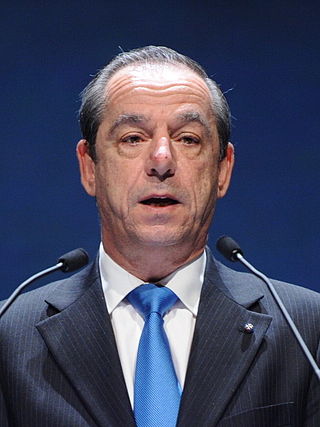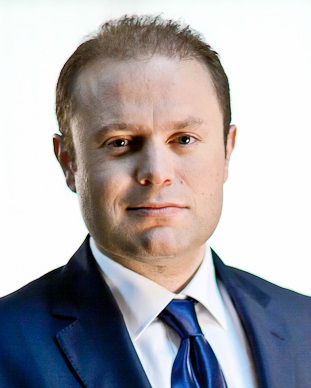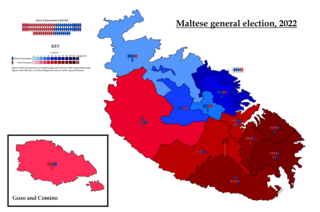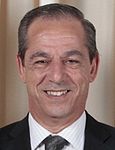
The politics of Malta takes place within a framework of a parliamentary representative democratic republic, whereby the President of Malta is the constitutional head of state. Executive Authority is vested in the President of Malta with the general direction and control of the Government of Malta remaining with the Prime Minister of Malta who is the head of government and the cabinet. Legislative power is vested in the Parliament of Malta which consists of the President of Malta and the unicameral House of Representatives of Malta with the Speaker presiding officer of the legislative body. Judicial power remains with the Chief Justice and the Judiciary of Malta. Since Independence, the party electoral system has been dominated by the Christian democratic Nationalist Party and the social democratic Labour Party.

The Nationalist Party is one of the two major contemporary political parties in Malta, along with the Labour Party.

The Labour Party, formerly known as the Malta Labour Party, is one of the two major political parties in Malta, along with the Nationalist Party. It sits on the centre-left of the political spectrum.

Lawrence Gonzi, is a Maltese politician, retired Nationalist politician and lawyer, who served for twenty-five years in various critical roles in Maltese politics. Gonzi was Prime Minister of Malta from 2004 to 2013, and leader of the Nationalist Party. He also served as speaker of the House from 1988 to 1996, and Minister of Social Policy from 1998 to 2004, as well as Deputy Prime Minister from 1999 to 2004. He served in practically all positions in Parliament, being also Leader of the House, an MP and Leader of the Opposition.

Simon Busuttil is the Secretary General of the EPP Group in the European Parliament. Formerly, he was Leader of the Opposition. and Leader of the Nationalist Party in Malta and a Member of the European Parliament for Malta.

Joseph Muscat is a Maltese politician who served as the 13th prime minister of Malta from 2013 to 2020 and leader of the Labour Party from 2008 to 2020.
Fifteen general elections have been contested since the granting of universal suffrage in Malta. Only 73 women have contested in these elections. The number of men, on the other hand, has exceeded 1000. The number of women contesting general elections has, however, increased over the years. In fact, the 1998 elections saw 24 women candidates participating, the highest number to date, with six of these getting elected, registering a 25 percent success rate.

General elections were held in Malta on 26 October 1996. Although the Malta Labour Party received the most votes, the Nationalist Party won the most seats. However, the Labour Party was awarded an additional four seats to ensure they had a majority in Parliament.

General elections were held in Malta on 8 March 2008 to elect all members of the House of Representatives They were held alongside local elections.

George Abela, is a Maltese politician who was the eighth president of Malta from April 2009 to April 2014.

Angelo "Anġlu" Farrugia is a Maltese politician and the current Speaker of the House of Representatives of Malta. Previously he served Deputy Leader of the Labour Party, a Member of Parliament and Shadow Minister for work, workers' rights and parliamentary affairs.

Joseph Cuschieri is a Maltese politician who has been a Member of the European Parliament since 2011 - 2013. Previously he served in the House of Representatives of Malta from 1998 to 2008. In 1994 he was elected and nominated first Deputy Mayor of St Julian's. He was born in a working-class family and joined the Labour Party at a very early age.

General elections were held in Malta on Saturday, 3 June 2017 to elect all members of the House of Representatives. The elections were contested by the Labour Party, led by Prime Minister Joseph Muscat, the Nationalist Party, led by opposition leader Simon Busuttil, and four other parties, making it the elections with most parties participating since 1962.
Franco Debono is a Maltese criminal trial lawyer and former Nationalist member of Parliament.

The 2014 European Parliament election in Malta elected Malta's delegation to the European Parliament from 2014 to 2019. This was the third such election held in Malta. The elections were held on Saturday, 24 May 2014.

Cyrus Engerer is a Maltese Member of European Parliament representing the Labour Party. A gay rights activist, he was the leading spokesperson for the Yes campaign at the 2011 Maltese divorce referendum. In 2021 he was tasked with negotiating the European Parliaments historic resolution on the declaration of the European Union as an LGBTQ Freedom zone, in reaction to the establishment of so called "LGBT-Free zones" in Poland. Engerer later went on to write the European Parliaments resolution which condemned the laws in Hungary which effectively banned "LGBT propaganda" in the vicinity of schools. From 2014 till 2019 Engerer was the Prime Minister's special envoy to the European Union. He was elected as a Member of the European Parliament in November 2020. After he joined the Labour Party the Police of Malta opened an investigation against him, leading to his father's arrest, the opening of a court case against him on spreading pornography and the arrest of his mother on election day. He himself was convicted for spreading revenge porn and received a suspended two years term imprisonment. He is the partner of Partit Laburista's Member of Parliament Randolph De Battista.
The following lists events from 2013 in Malta.

General elections were held in Malta on 26 March 2022 to elect all members of the House of Representatives.

The 2019 European Parliament election was held in Malta on 25 May 2019. 8 different political parties took part in the election, of which, only 2 won seats in the European Parliament; the Labour Party and the Nationalist Party, with 4 and 2 seats respectively.
The next general election will be held in Malta by 2027 to elect all members of the House of Representatives. The Labour Party, which had governed Malta since 2013, won a third term in the 2022 election under Robert Abela. Shortly after the election, Bernard Grech was re-elected unopposed for the leader of the Nationalist Party.



















